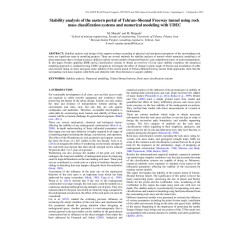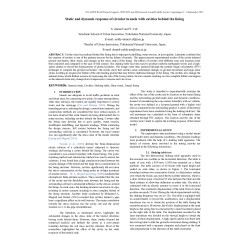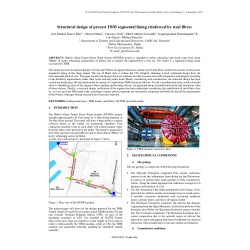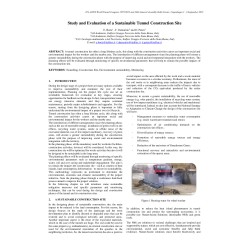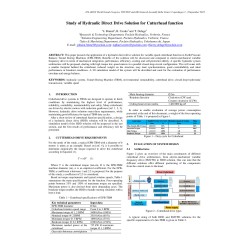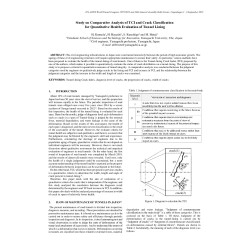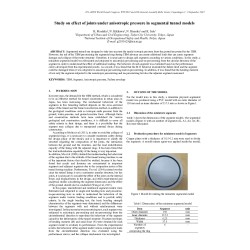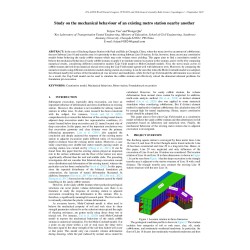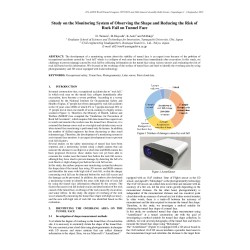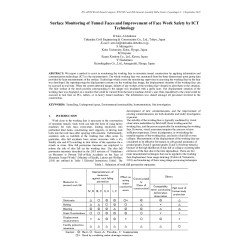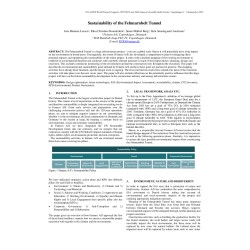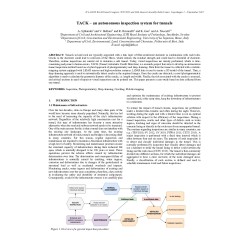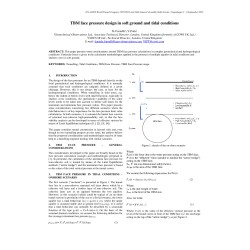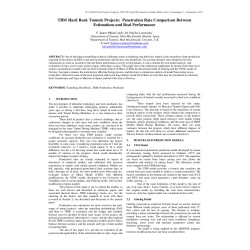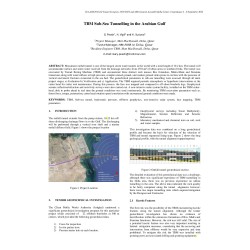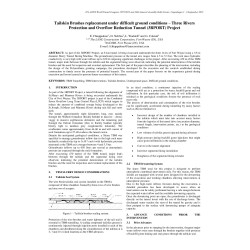No document
Search & filter
Search for a publication
Search & filter
World Tunnelling Congress
WTCThere are 1984 documents.
-
Stability analysis of the eastern portal of Tehran ïShomal Freeway tunnel using rock
Abstract: Stability analysis and design of the support systems according to physical and mechanical properties of the surrounding rock mass are significant steps in tunneling projects. There are several methods for stability analysis of tunnels which numerical modeling is of great importance due to its high accuracy, ability to utilize various models of material behavior, and comprehensiveness of result...
0,00 € -
Static and dynamic response of circular tunnels withcavities behind the lining
Abstract: Cavities may be produced behind the lining due to improper backfilling, water erosion, or poor quality. Literature confirms that the creation of cavities is one of the primary reasons for the failure of tunnels. This paper presents experimental results of the cavity-induced ground movement, shear strain, and changes in the stress states of the lining. The effects of cavities with different...
0,00 € -
Structural design of precast TBM segmental lining reinforced by steel fibres
Abstract: Dubai’s Deep Tunnel Storm Water System (DTSWS) project is intended to collect subsurface and storm water from about 500km2 of newly urbanising communities of Dubai, and to transfer the captured flow to the sea. The tunnel is a segmental lining tunnel excavated by TBM. The tunnel presents an internal diameter of 10m and 350mm of segment thickness and the use of steel fibres reinforced concrete...
0,00 € -
Study and Evaluation of a SustainableTunnel Construction Site
Abstract: A tunnel construction has often a long lifetime cycle, this along with the construction activities causes an important social and environmental impact for the workers and the nearby area. The introduction of different arrangements since the planning phase will ensure a greater sustainability during the construction phase with the purpose of improving social and environmental integration with...
0,00 € -
Study of Hydraulic Direct Drive Solution for Cutter head function
Abstract: This paper presents the application of a hydraulic direct drive solution for variable speed cutterhead function in Earth Pressure Balance Tunnel Boring Machines (EPB-TBM). Benefits of the solution will be discussed and compared to electro-mechanical variable frequency drive in terms of mechanical integration, performance, efficiency, cooling and self-protection ability. A specific hydraulic...
0,00 € -
Study on Comparative Analysis of TCI and Crack Classification
Abstract: The civil engineering infrastructures in Japan were constructed intensively between the period of high economic growth. The ageing of these civil engineering structures will require appropriate maintenance to ensure their safety. In particular, various methods have been proposed to evaluate the health of the tunnel-lining of road tunnels. One of them is the Tunnel-lining Crack Index (TCI)...
0,00 € -
Study on effect of joints under anisotropic pressure in segmental tunnel models
Abstract: Segmented tunnels are designed to take into account the nearly isotropic pressure from the ground excavated by the TBM. However, the tail of the TBM pressurizing the segmental ring during TBM advance can create additional loads that can cause segments damage and collapse of the entire structure. Therefore, it is necessary to design safe segments according to various conditions. In this study, a...
0,00 € -
Study on the mechanical behaviour of an existing metro station nearby another
Abstract: In the case of Jincheng Square Station with Park and Ride in Chengdu, China, where the strata involve an amount of cobblestone, the new Subway Line 16 and transfer zone is in proximity to the existing Subway Line 18 station. So far, however, there are not any constitutive models better behaving the sandy cobble stratum which may exist volume stress yielding. This paper aims to find a...
0,00 € -
Study on the Monitoring Systemof Observing the Shape andReduc ingthe Riskof
Abstract: The development of a monitoring system about the stability of tunnel face is an urgent issue because of the problem of occupational accidents caused by "rock fall" which is a collapse of rock near the tunnel face immediately after excavation. In this study, we challenge to prevent damage caused by rock fall by collecting information on the tunnel face using various sensors and evaluating the...
0,00 € -
Surface Monitoring of Tunnel Faces and Improvement of Face Work Safety by ICT
Abstract: We report a method to assist in monitoring the working face in mountain tunnel construction by applying information and communication technology (ICT) to the measurements. The whole working face was monitored from the three-dimensional point group data provided by laser measurements of the surface. Technology which assists the monitoring supervisor in assessing the working face by the face was...
0,00 € -
Sustainability of the Fehmarnbelt Tunnel
Abstract: The Fehmarnbelt Tunnel is a huge infrastructure project – even on a global scale. Hence it will potentially have a big impact on the environment in broad terms. Consequently, the owner (Femern A/S) has developed a comprehensive plan for mitigating these potential impacts and supporting the sustainability of the entire project. It starts with a detailed mapping of the existing environment to...
0,00 € -
TACK - an autonomous inspection system for tunnels
Abstract: Tunnels in hard rock are typically supported with a thin layer of fibre-reinforced shotcrete in combination with rock bolts. Cracks in the shotcrete could lead to corrosion of the fibres, which reduces the residual strength and could lead to downfall of shotcrete. Therefore, routine inspections are carried out to maintain a safe tunnel. Today, visual inspections are mainly performed, which is...
0,00 € -
TBM face pressure design in soft ground and tidal conditions
Abstract: This paper presents some considerations around TBM face pressure calculations in complex geotechnical and hydrogeological conditions. Particular focus is given to the calculation methodologies applied in the presence of multiple aquifers in tidal conditions and shallow cover in soft ground.
0,00 € -
TBM Hard Rock Tunnels ProjectsPenetration Rate Comparison Between
Abstract: One of the biggest tunnelling technical challenges when considering long hard rock tunnels is the estimation of the production expected in the project and how to get precise penetration and advance rate predictions. An accurate advance rate estimation (by basic calculations) as close as possible to the real future performance, mostly in long tunnels, is a key element for rock tunnel analysis...
0,00 € -
TBM Sub-sea Tunnelling in the Arabian Gulf
Abstract: Musaimeer outfall tunnel is one of the longest storm water tunnels in the world with a total length of 10.2 km. The tunnel will accommodate surface and storm water received from the drainage networks from 270 km² of urban areas in southern Doha. The tunnel was excavated by Tunnel Boring Machine (TBM) and encountered three distinct rock masses Rus formation, Midra-Shale and Simsima Limestone...
0,00 € -
Tailskin Brushes replacement under difficult ground conditions - Three R ivers
Abstract: As part of the 3RPORT Project, an 8 km tunnel is being excavated underneath the three rivers of Fort Wayne using a 5.8 m diameter Slurry Tunnel Boring Machine. The groundwater pressure at the tunnel axis ranges from 4.5 to 5.3 bar. The rock mass hydraulic conductivity is very high with water inflows up to 630 l/s imposing significant challenges to the project. After excavating 470 m of the TBM...
0,00 €

